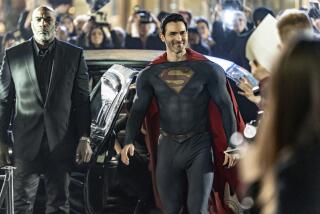ABC SPECIAL : ‘45-85’ TO FOCUS ON YEARS FOLLOWING WORLD WAR II
- Share via
NEW YORK — ABC’s ambitious three-hour news special, “45-85,” commemorating the 40th anniversary of the end of World War II, will cover 40 years of history with everything from interviews with world leaders to home movies when it airs on Sept. 18.
Av Westin, ABC News vice president for program development and executive producer of the special, got the idea while on jury duty.
“I got a telephone call from one of our senior executives,” Westin said, “and he said, ‘Look, we don’t want to refight World War II--CBS is going to refight it with Cronkite and Eisenhower and all the old crew. NBC announced they were going to refight part of it. We think maybe the way to go is to tell what’s happened since 1945 so we can put that legacy into perspective. What would you do?’
“So while I was sitting listening to boring testimony I came up with the idea for ‘45-85.’ ”
The show, anchored by Ted Koppel and Peter Jennings, will break the period down into eras--1945-52, 1952-60, 1960-75 and 1975-85. It has a definite starting point and a point of view.
“In 1945, Harry Truman called together the National Security Council and issued NSC Document 68 which said, in effect, that world communism, perceived as a monolith directed from Moscow, was our enemy,” Westin said.
“From that time until now that has been the policy of the United States and Presidents have used a variety of tactics to implement the strategy of holding the line or rolling them back or containing them.
“We have now completed interviews with 105 witnesses--not professors of history or philosophers but men and women who were actually in the room when decisions were made, or who were directly affected by those decisions.”
He said the witnesses include three ex-Presidents, four former secretaries of state, Libya’s Moammar Kadafy, Israeli, British, French and Japanese leaders.
“That’s the high,” he said. “The low, as we call it, includes a young man who was 14 years old in Greece and knew the Truman Doctrine was working because the Communist bully boys were no longer beating him up on the way to school, and a German woman who was 9 years old during the Berlin airlift and wrote to the Americans and said, ‘Please drop me some candy when you fly over Berlin.’
“Another witness is the current president of Honda, who as a young Japanese engineer was assigned the job of taking an American automobile executive around a test track in Japan and was told, as they got out of the Honda Civic, ‘Nice car, kid. Nobody’ll ever buy it.’ ”
Westin said “45-85” not only has extraordinary anecdotal material, but extraordinary video to go with it.
“Some of this video has never been seen before,” he said, “because we put ads in newspapers asking for people who had personally taken pictures of Harry Truman, for instance, or people who had taken pictures in Japan or China years ago.
“What has begun to surface are people’s home movies, some of which are surprisingly professional.”
The program also will include artifacts of the periods involved, from the hula hoop to the first television, from the first container for birth control pills to the tail fins of a 1957 Cadillac to an ad for Levittown pitching a $10,000 house complete with white picket fence.
The show will conclude with interviews speculating on the future.
“45-85” will be fully sponsored by IBM. Will it sell?
“You have the automatic, dedicated news hounds and historians,” Westin said. “They will watch. Then you have other people who say, ‘I’m not interested in that at all.’ You could dream and say you hope you’ll get those people, but really it’s the middle ground of people you hope to get.
“They are acclimated to things in short bursts. Television, for good or ill, has educated the American viewer to accept information in short bursts, and I think the construction of the program--it’s a series of short bursts--will stop people from becoming bored. We say, think about this for a second while we move on. That really takes advantage of what we in television had done to educate the American people to accept information.
“They accept information faster, and they retain it longer than ever before, and I think that is because they can grasp things more quickly than they ever did before.
“The three hours really gives you time to move around and be adventuresome, but it also imposes a burden of production. You can put people to sleep with the tonnage.”
More to Read
The complete guide to home viewing
Get Screen Gab for everything about the TV shows and streaming movies everyone’s talking about.
You may occasionally receive promotional content from the Los Angeles Times.






